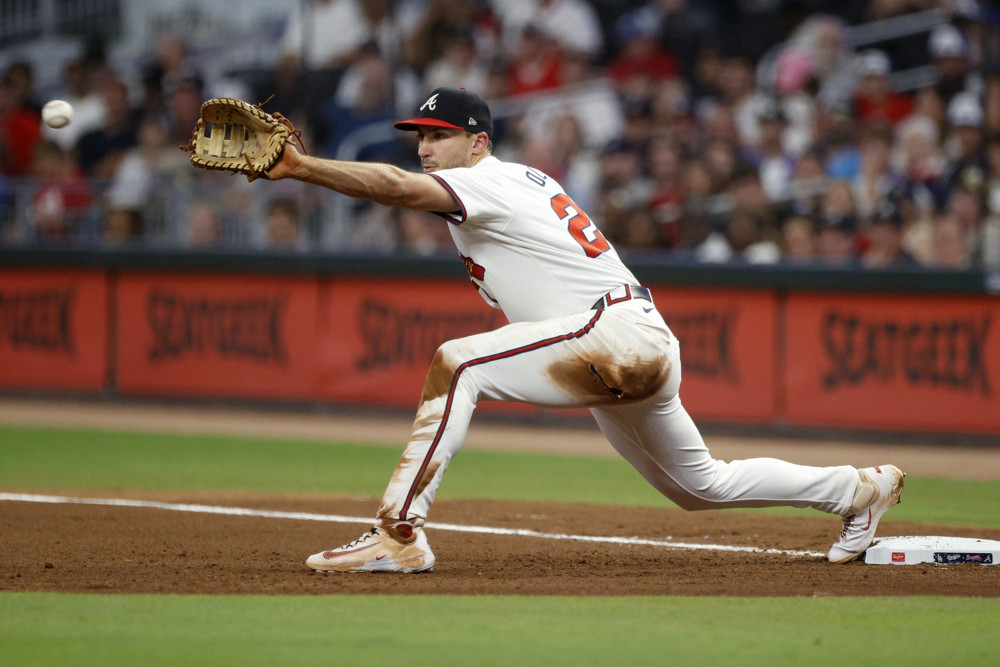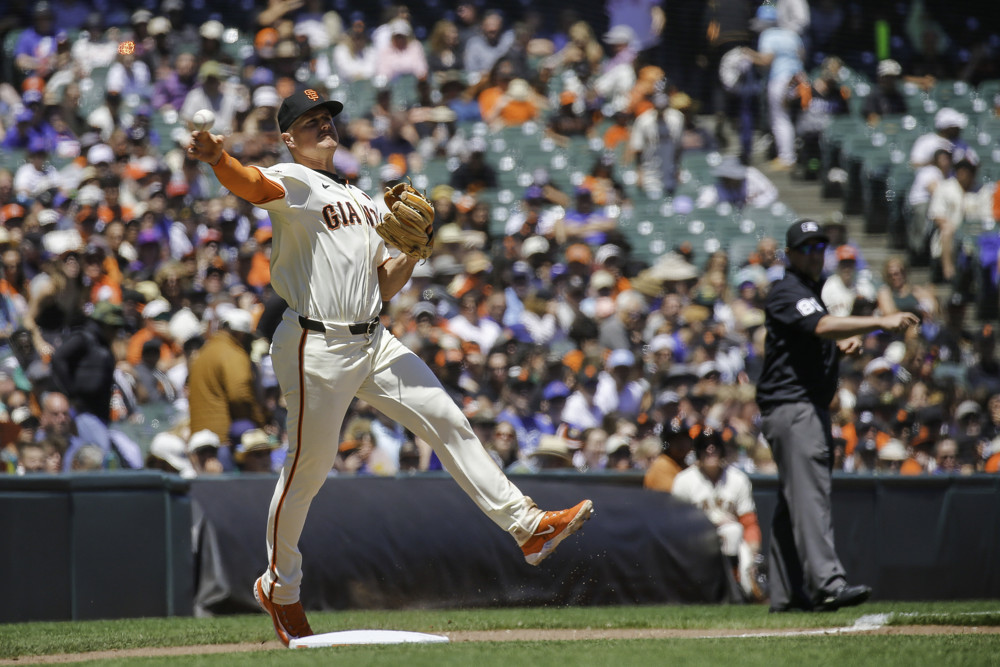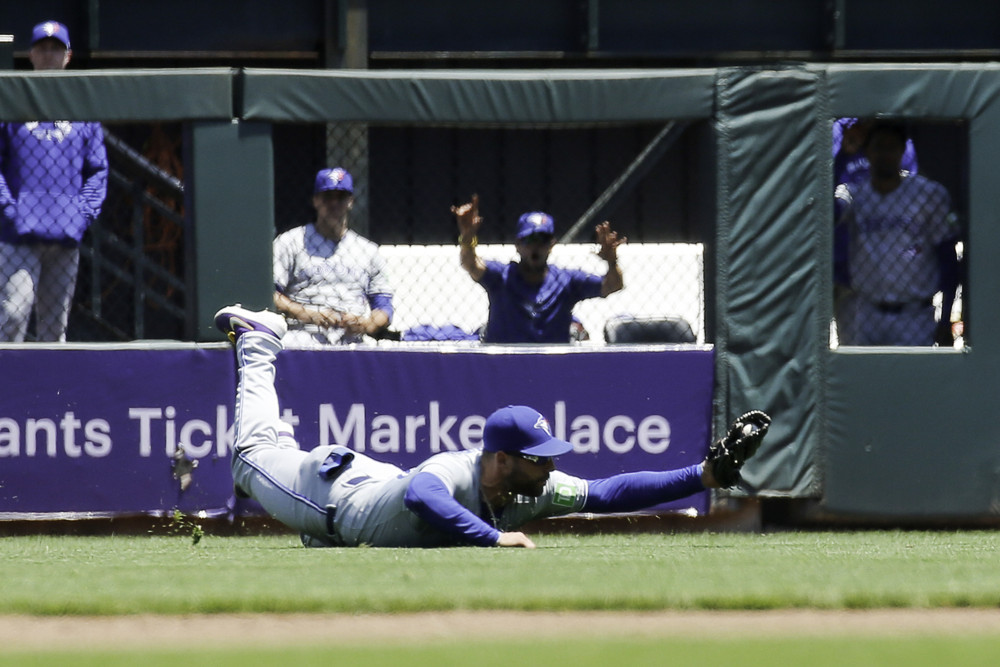In his second year in the minor leagues, Nationals prospect Trey Lipscomb got a full workout. He played all four infield positions, earned a promotion to Double-A, and won the Rawlings Minor League Gold Glove Award at third base. He totaled 3 Defensive Runs Saved there, meaning he performed at a slightly above-average level compared to MLB players, which is pretty good for someone in Double-A.
We spent a good part of 2023 talking to coaches about teaching defensive excellence. So it makes sense that we talk to players about what it’s like to learn defensive excellence too. Trey is the second in what we hope will be an ongoing series of interviews.
Mark: What does defensive excellence mean to you?
Trey: When you put those two words together, defensive excellence, it’s just something that I take a lot of pride in. Obviously, you’re not going to be perfect. The game of baseball is not about perfection, but if you can be as physically sound and mentally sound on defense as you can, it can help you a lot.
One of the mantras I’ve always gone with is: They always say speed doesn’t slump. For me, defense doesn’t slump. It’s something that you should really take pride in. That’s something that I did coming into this season. And I think the end goal is definitely what I achieved.
Mark: Where did learning defense start for you?
Trey: It really started when I started to focus on baseball in 6th, 7th grade. I wanted to get along with everybody, and I know the pitcher’s out there working his butt off. If a ground ball is hit to me, I want it to be a sure out every time.
So I think that’s what I took pride in. I pitched a little bit in college. I definitely want a bunch of defenders behind me that are going to make the play. That’s how you build a bond with each other.
Mark: You played all four infield positions last season. What was the hardest part of learning them?
Trey: I told the player development guy when I was in spring training, I can play second base. I can play shortstop. He said, ‘We’ll see.’ I guess I got what I wished for.
You’ve just gotta get out there and get your feet wet. One of the biggest things was positioning. At second base and shortstop, there’s no line to guard. You just want to be in the right place at the right time. The biggest thing was learning where to be and where to set myself up so I can make the play every time.
Mark: When you play third base, is your pre-pitch position low?
Trey: When I was in college, I was one of those who was as low to the ground as I could be, but as I’ve gotten up here and played in the minor leagues in my first four years, it’s kind of just become wherever I’m comfortable.
When I was in Double-A, one of our coaches, Delino DeShields asked about my positioning and said, ‘You played basketball, right? How are you going to guard somebody?’
I showed him [my stance for] how I was gonna guard somebody. And then he was like, all right, we’re gonna start there. We want you to be able to use your athletic ability. I was getting so low into the ground where it was kind of hard to get up out of the ground and have a good first step. I’ve gotten better at forming a position that’s better for me.
Mark: Are there other people besides Delino that have been instrumental in helping you out, and if so, what did they do?
Trey: My father’s been there from the jump. He went to The Citadel. He never played baseball growing up, but he was always like ‘We’re going to find a way and we’re gonna get it done.’
I had a phenomenal infield coach my first three years at Tennessee, Ross Kivett. He taught me a lot of the technique. My last year at Tennessee, it was Ricky Martinez. Those two guys helped build the foundation for how to field a ground ball. And then Cody Ransom with the Nationals helped me out with doing a lot of early work.
Mark: What is your pre-game routine like?
Trey: I start by getting my body loose, then go in the outfield grass, start on my knees, and have a coach roll me a few balls. I use my mini-glove and try to catch it in the pocket every time. When you hear that sound, a pop of the ball hitting the pocket, it’s a soothing sound. The more you repeat it the better it gets. Using a mini-glove helps you narrow it down. I’m doing forehands, backhands, balls right at you.
I use my mini-glove and try to catch it in the pocket every time. When you hear that sound, a pop of the ball hitting the pocket, it’s a soothing sound. The more you repeat it the better it gets.
Then I’m standing up and getting the feet loose. Five balls right at me, five to my left, five to my right, working on forehand and backhand. Then I get into a stance where I’m going to throw a ball. Then I go on the infield dirt, five at me, five to my left, five to my right. You don’t want to tire yourself out, but 20 to 25 ground balls really help.
Mark: You’ve got an Instagram with a pretty good highlight reel. Do you have a favorite play?
Trey: It wasn’t a ground ball, but the diving play that I made, sliding feet first into the gravel over there. That had to be one of my favorites.
I really take pride in slow rollers. I was horrendous at slow rollers when I was at Tennessee because I just couldn’t find the arm slot. Then I worked on it for a while, and it got tremendously better and that became my favorite play.
Mark: What do you see when you’re approaching a slow roller?
Trey: Barehand are usually such that you don’t have time to think about it. It’s just about instincts. I like the backhand barehand. Just putting my body in a unique position, and then throwing the ball, I just think its satisfying, the way you can see the ball tail back into the first baseman’s glove when you complete one.
Mark: I saw a quote in one article where you said, ‘I like to ask questions, but when I can get information without asking questions, and then apply it to my game, that’s my type of learning.’ What does that mean?
Trey: Everyone’s here in the minor leagues trying to make you better. They have their way when they were a stellar player. But it’s just a plan. No one’s going to be the same. No one’s going to have the Mike Trout swing. It’s going to be your swing.
I know a lot of people who are fielding ground balls like this and like that. There’s no right way and there’s no wrong way. You’re getting a lot of information thrown at you, but the more you can narrow it down and focus it more on yourself is when you’re going to become the player you want to be. I’m by no means anywhere near that, but we’re just getting started.
Mark: How close to major league ready do you feel on defense?
Trey: I definitely take pride in my defense. I’m going out there every day getting the work in. I want to make the last out of Game 7 of the World Series every time. That’s what I treat every, every ground ball from warmups to going out there and getting a ground ball in the first inning, second inning, or fourth inning.
Mark: How do you use data and information in terms of playing?
Trey: You get your scouting reports before the game about pull hitters, which guys like to bunt. If you can have a head start on getting a good first step to make those bang-bang plays more of a routine play, that’s what I focus on. If you can dominate the average play, I think that’s going to help you a lot in the long run.
If you make the ESPN Top 10 plays, then you’re gonna get the credit and get to be on tv. But no one shows the ground balls that are right at you, they only show those when you make an error.
Mark: I saw you had a clinic for kids. What’s it like to teach defense?
Trey: I was teaching them the fundamentals of just fielding the ground ball and catching the ball, feeling it in that same spot of the glove every time and just getting outs. It’s cool to see kids and build those connections. You never know. Eventually you might be playing against some of those kids and take something you taught them and apply it to your game. I think that’s a cool thing.



